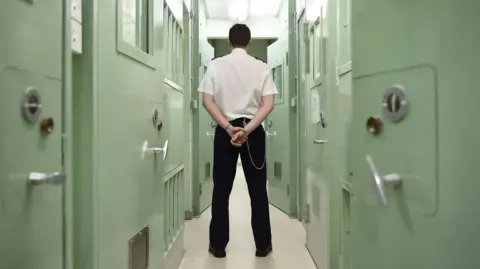ARTICLE AD BOX

 PA Media
PA Media
The Independent Sentencing Review warns that "we cannot build our way out of" prison overcrowding
Violent prisoners, including those convicted of sex offences and domestic abuse, could be released after serving just a third of their sentence, under new recommendations made in a landmark review.
The Independent Sentencing Review also recommends that more offenders are managed in the community instead of serving custodial sentences, as a way of easing overcrowding in prisons.
Former Lord Chancellor David Gauke, who chaired the review, said major reforms were needed to "end the dangerous cycle of emergency releases" of prisoners.
"The scale of the crisis we are in cannot be understated," he said. "Overcrowded prisons are leading to dangerous conditions for staff and contributing to high levels of reoffending."
Last year, thousands of inmates were released early in an emergency measure to deal with prison overcrowding.
Eligible prisoners serving more than five years were automatically released after serving only 40% of their fixed-term sentence, rather than the usual 50%.
The government then commissioned the Independent Sentencing Review to look into the causes of the crisis, and to consider alternative punishments to custodial sentences.
The government previously confirmed it wanted to start work on three new prisons before the end of 2025, and that £4.7bn would be allocated for prison-building between 2026 and 2031 at the government spending review, due next month.
But in the report released on Thursday, Mr Gauke warns "we cannot build our way out of" the overcrowding crisis.
The government is expected to accept some of the key measures in principle, with further detail to follow in a future sentencing bill.
Justice Secretary Shabana Mahmood is expected to respond to the review on behalf of the government in the House of Commons later on Thursday.
The review also calls for:
- Offenders to be given short custodial sentences of less than 12 months in only exceptional circumstances, such as if they don't comply with court orders or to provide respite for victims of domestic abuse
- Suspended sentences to be allowed for up to three years, and for them to be used more for low-risk offenders with high needs, such as people with substance abuse issues or pregnant women
- Courts to have greater flexibility to impose fines or travel, driving and football bans
- More funding for the Probation Service - which supervises offenders serving community sentences or those released into the community from prison - and greater availability of electronic monitoring equipment like tags
It also proposes an "earned progression model" for offenders, inspired by reforms in the US state of Texas. The BBC visited a high-security, supermax prison in Texas with Ms Mahmood in February.
Under an earned progression model, offenders would progress through three stages: custody, where prisoners are incentivised to behave; post-custody, where offenders are strictly supervised and subjected to licence conditions; and the at-risk stage, where offenders aren't supervised but can be recalled if they offend again.
Prisoners on standard determinate sentences - a fixed-length prison term - could move to the post-custody stage after serving one-third of their sentence providing they behave well. If not, they stay until halfway.
This could include sex offenders and perpetrators of domestic abuse.
The review also recommends that specialist domestic abuse courts should also be expanded to better support victims, and more perpetrators of violence against women and girls should be tagged.
Perpetrators of domestic abuse should be more clearly identified at sentencing so that the right interventions are put in place for them to be managed inside and outside prison, it adds.
BBC News understands that tens of thousands more offenders could also be tagged under the proposals, putting further pressure on an already stretched probation system.
Although the review recommends more resources for probation, staff say they're worried about being put under even more pressure.
One probation officer told BBC News: "We can't cope now, God knows how we'll cope if these recommendations are accepted. I'm already looking for another job. It's just not possible to do all this work."
William Morey, who was convicted of murder in 1988 and served a decades-long prison sentence, told BBC News that prisons "are not running properly, because they haven't got the staff to run properly". Morey said he feels deep regret for his crime.
"I was really shocked at the levels of self-harm, the levels of violence, the lack of staff, the continual bang up," he said.
"I think the thing we need to take into account is, what kind of sentences are these people going to be given, and what kind of help is there in the community for these people?"
He also told BBC News that he was worried about the strain it would be put on the "already overwhelmed" probation service.
'Act with bravery'
England and Wales has one of the highest prison population rates in western Europe.
An interim report from the Review, published in February, found the prison overcrowding problem was driven by successive governments trying to look "tough on crime".
Despite overall crime rates declining since the mid-1990s, the prison population in England and Wales almost doubled between 1993 and 2012, while reoffending has remained high, it said.
Governments over the past 25 years jailed more criminals, despite evidence that it does not prevent re-offending, the report added.
Mr Gauke also previously warned that without radical change, prisons in England and Wales could run out of space again by next Spring.
Thursday's recommendations, Mr Gauke says, are "focused not only on bringing the prison population under control but ultimately reducing reoffending and ensuring victims are protected".
"Taken as a package, these measures should ensure the government is never again in a position where it is forced to rely on the emergency release of prisoners," he adds.
"I urge the Lord Chancellor and Prime Minister to act with bravery in their response."
Andrea Coomber KC, chief executive of Howard League - a national charity working for less crime, safer communities and fewer people in prison - supported moves to increase the number of community punishments.
She told BBC News that it would be "much better [for offenders to] spend more of their sentence in the community with access to courses, access to support, to housing, education, relationships with families - those things that are proven to stop reoffending".

 2 hours ago
1
2 hours ago
1








 English (US) ·
English (US) ·